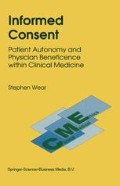Abstract
Informed consent did not spring full-armored like Athena from the head of Zeus. As already noted, it has undergone a long development in Anglo-American law. Equally, though only in more recent years, the doctrine has been appropriated by a broad-based movement to reform medicine in ways felt to be more congruent with the general practices and aspirations of a free society. And it is to this social movement, this “new ethos of patient autonomy” (McCullough and Wear, 1985; Wear, 1991), that we must now refer in order to understand the agendas, insights and arguments behind the doctrine of informed consent.
Access this chapter
Tax calculation will be finalised at checkout
Purchases are for personal use only
Preview
Unable to display preview. Download preview PDF.
Notes
Beecher, 1966.
There are various sources of paternalism in medicine, some credible, some not. I am concerned here with the variety that bases its actions on an articulate vision of patients’ best interests and the threats to these interests in the situation of illness. Paternalism can also spring from a penchant for convenience and control, at times ego-gratification and arrogance, that proceeds by ignoring the needs and concerns of patients, as well as the value-charged character of medical decision-making. The latter sources of paternalism, I submit, are simply pathological in clinicians, and have no credence.
See the next chapter for extensive discussion in this regard.
See the next chapter regarding such ineffectiveness.
Author information
Authors and Affiliations
Rights and permissions
Copyright information
© 1993 Springer Science+Business Media Dordrecht
About this chapter
Cite this chapter
Wear, S. (1993). The New Ethos of Patient Autonomy. In: Informed Consent. Clinical Medical Ethics, vol 4. Springer, Dordrecht. https://doi.org/10.1007/978-94-015-8122-6_3
Download citation
DOI: https://doi.org/10.1007/978-94-015-8122-6_3
Publisher Name: Springer, Dordrecht
Print ISBN: 978-90-481-4219-4
Online ISBN: 978-94-015-8122-6
eBook Packages: Springer Book Archive

